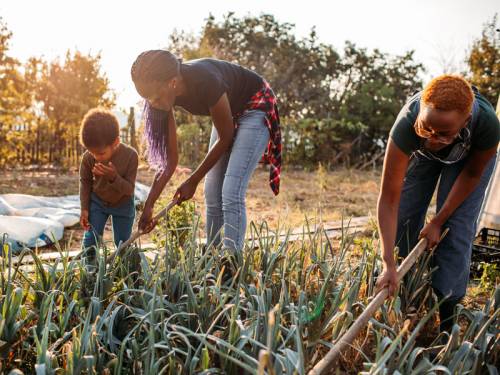FOOD AND FAITH
by Derrick Weston | Presbyterians Today
 Whenever I can, I recommend Natasha Bowens’ book “The Color of Food: Stories of Race, Resilience and Farming.” It is a photo journal highlighting Bowens’ visit to Black, Latinx and Indigenous farmers. The stories told are those of coming to terms with the horrors of enslavement, genocide and migration that have shaped the American food system, and how redemption is taking root. But it wasn’t always redemptive.
Whenever I can, I recommend Natasha Bowens’ book “The Color of Food: Stories of Race, Resilience and Farming.” It is a photo journal highlighting Bowens’ visit to Black, Latinx and Indigenous farmers. The stories told are those of coming to terms with the horrors of enslavement, genocide and migration that have shaped the American food system, and how redemption is taking root. But it wasn’t always redemptive.
For those in the Black community struggling for middle-class respectability, progress often meant moving away from farming. The same has been true for Mexican and Central American immigrants looking to distance themselves from the fields where many still pick produce for absurdly low wages. Bowens questioned her own journey, asking, “Was I returning to a trade my ancestors worked to free me of? Or was I bringing back a powerful connection to the land that my generation had lost?”
It turns out that she was bringing back a powerful connection that could heal past traumas and today’s broken systems. Bowens is not alone. I spoke with Dr. Monique Williams, executive director of the Heirloom Foundation, an organization dedicated to creating educational activities in natural spaces with a focus on healing. Williams drew on her own experience of healing in nature. While tending to her brother during a recent battle with cancer, she found herself outside running to clear her head. In those moments, she had an experience of healing where she was allowing God to refuel her in nature. The land helped her to not only remember who she belonged to, but it also helped to “re-member” — reconnect her being to God. She described the experience of “God piecing me back together for a greater purpose.” That purpose led to the Heirloom Foundation, which was started as a place for African Americans to begin a reckoning with land. “Enslavement almost made us hate the land. Progress meant being as far from the land as possible. The question we ask at the foundation is, ‘How can you be re-membered by nature?’” said Williams.
Williams further explained how nature can heal the trauma that lives inside by taking us outside of ourselves. “Nature gives us space to receive grace. If we give effort, God gives us grace” was an epiphany she had while breaking the ground to harvest potatoes. Progress is no longer being seen as steering clear of working the land. Rather, it is a place where redemption can be found. Yet there is still more ground to be tilled. According to a 2021 study by the global research firm McKinsey & Co., 1.4% of farmers identify as Black or mixed race compared with 14% a century ago.
Derrick Weston is the co-host of the “Food and Faith” podcast at foodandfaithpodcast.org. He is a member of Ashland Presbyterian Church in Hunt Valley, Maryland.



No comments:
Post a Comment